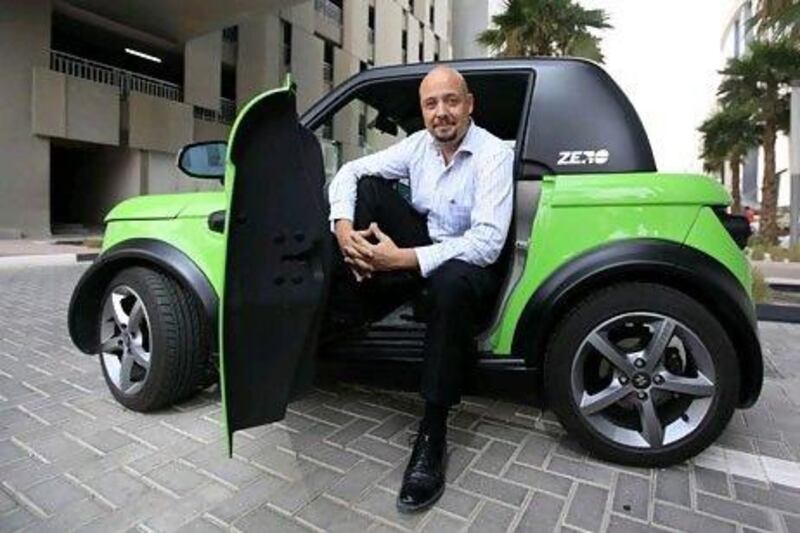Michael Kraemer, a lawyer at Taylor Wessing, has plenty of enthusiasm to match the unusual nature of his mode of transport - he is behind the wheels of the only electric car seen on Dubai's roads.
The little machine guarantees him immediate attention: valets fall over themselves to park his vehicle; and schoolchildren crowd around it in excitement, plying its driver with questions.
Even if Mr Kraemer is not exactly the attention-seeking type, he does have an agenda to promote. He is a committed environmentalist who has long been appalled by the carbon footprint of the gleaming metropolis he has lived in for the past six years.
The UAE is the second-biggest emitter of carbon dioxide per capita, after Qatar, and environmental concerns have so far made little impact on the way its inhabitants live. Driving an electric car is one way to demonstrate things can be done differently.
And things are, slowly, beginning to be done differently.
Both Abu Dhabi and Dubai have made commitments to introducing solar power into their energy mix, and green building standards are coming online in the construction sector.
For Mr Kraemer, the pace of change remains frustrating. But after spending the past two years with 4x4s bearing down on his diminutive vehicle on the Sheikh Zayed highway, he believes UAE roads are on the brink of a small revolution.
Should he get his way, his Tazzari Zero electric car - which reaches up to 100kph but has no air conditioning - will soon be powered by solar energy. This will make his car truly carbon neutral, something not yet achieved, as the electricity it uses now is generated in conventional power plants.
"It's nice to show that solar isn't just for home use, but that it can be used for other purposes," he says.
To prove his point, Mr Kraemer has been assembling a solar electric car charging station, with a little help from fellow solar enthusiasts.
The equipment was donated to him by various companies. Siemens has supplied him with the charging station itself, while Trina Solar and Canadian Solar have provided a total of 19 solar panels.
The Dubai Electricity and Water Authority (Dewa) is now considering his proposal to link the solar array to the grid and Mr Kraemer is hopeful permission will be granted in the coming weeks.
Dewa's growing interest in solar power has manifested itself recently as Dubai unveiled plans for the 1,000 megawatt Mohammed bin Rashid Al Maktoum Solar Park that is due to be completed by 2030.
The authority is also not blind to opportunities on a different level, and has also been in discussions with Vahid Fotuhi, the head of the Emirates Solar Industry Association, to install Dubai's first grid-connected solar array on the roof of his villa, even before Mr Kraemer came knocking.
The green-minded lawyer concedes electric car battery technology is not sufficiently developed to provide a range that would make them a true competitor to the conventional engine.
But he is optimistic about generating solar power in private houses and feeding it into the grid, a model that has been widely adopted in his native Germany, where households receive so-called feed-in-tariffs for the electricity they produce.
Given the German experience, Mr Kraemer believes solar installations on the rooftops of residential properties, commercial buildings, factories and warehouses could dwarf the output of Dewa's solar park.
Many obstacles remain, however.
Dewa, for one, is cautious about the effects large amounts of diffuse energy sources could have on grid stability. The authority is currently installing smart meters across the emirate, an important component for a flexible grid. But the roll-out will take many years.
A feed-in-tariff is also needed to make the installation of solar panels economical to households.
Mr Kraemer hopes Dewa will make use of his installation to test the viability of rooftop solar in the emirate and to familiarise themselves with the concept.
Most of all, though, he was motivated by the desire to get the ball rolling: "Someone had to start doing something," he says.





